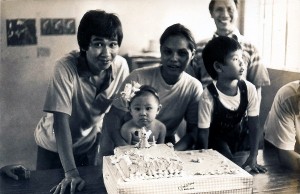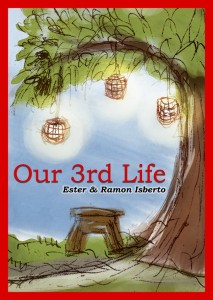They remember the Marcos tyranny for their children

Ramon and Ester Isberto celebrate daughter Mai’s second birthday at the Bicutan detention center. Photo courtesy of the Isberto Family
As we mark another anniversary of Martial Law, one point is worth noting: So many stories from that period have yet to be told.
Not just stories of heroes and martyrs, such as Edgar Jopson, Ferdie Arceo, Eman Lacaba and Lorena Barros, but also of families of activists and citizens who bore the brunt of regime’s abuses, and helped wage the fight to defeat it.
Fortunately, that shortage has been eased somewhat with the recent release of such books as the moving “Subversive Lives” about the Quimpo family and “Tibak Rising: Activism in the Days of Martial Law,” a lively collection of activist recollections of the period edited by UP Prof. Ferdie Llanes.
Now comes another family memoir of the martial law era.
Ramon and Ester Isberto have modest goals for putting out “Our 3rd Life,” an account of their struggles as a young couple during the Marcos regime.
The Isbertos are publishing the book themselves.
“We are doing this on our own for the children and apos,” Iting Isberto told me.
“Cottage industry ito, Boying,” Mon added. “Hindi naman blockbuster ito.”
It should be.
Independent filmmakers looking for new material can find a treasure of a story in “Our 3rd Life,” which is set to come out later this year. It has all the elements of an engaging film: family, love and romance, politics and revolution, comedy and suspense.
Take the book’s opening scene.
Iting Isberto is alone in a prison cell. She and Mon have just been arrested by the Marcos military. Their captors have separated them, and she doesn’t know where he is.
Is he safe? Is he still alive?
“It was very cold that early morning in December 1977, but I was wide awake,” she writes. “It was still dark and I guessed it was about 4 a.m. I listened for a few minutes and slowly, faintly, amid the silence, I could hear a tune being whistled from a distance. I smiled. It was another day and I knew Papa Mon was ‘safe’ in his cell, at the other side of the prison building where we were being held. After the whistling stopped, I started to sing several songs. Today, I began with “I Wanna Be Free.”
The memoir is told through letters to their children and grandchildren, including Kukok, Maia and Zac.
“Kukok, this is the story of how your Papa Mon and I met, fell in love and became political detainees under the government of President Ferdinand Marcos,” Iting writes. “And how we regained our freedom.”
Mon and Iting came from middle class families, went to exclusive Catholic schools, and enjoyed protected, comfortable lives. They met and fell in love when they were in high school. They were both swept up by the activist ferment in the late 1960s and early 1970s.
Like many young Filipinos, their lives changed dramatically when Ferdinand Marcos set up his dictatorship by imposing martial law in 1972.
It was an uncertain time. Still, given their backgrounds, Iting and Mon could have simply stuck to the middle class path that was there for them to take.
They didn’t.
Like many young Filipinos of their generation, they joined the underground fight against the regime.
“I joined because this was the only group of people I could see that had the determination to fight for the social and political changes that our country so badly needed,” Iting writes.
That decision cost her freedom. Iting was arrested shortly after joining the UG. But her first prison stint gave her a deeper sense of what the fight she joined was about.
“It was there in the Lahug detention camp where I understood better what it meant to love your country and to stand by your commitment in the face of great danger,” she writes. “I met young intelligent men and women from other parts of the Visayas such as Leyte, Samar, Negros Occidental and some from Luzon who had been very active in the underground movement. I marveled at their courage and composure in spite of the hardships they went through at the hands of their military captors. How they could still smile and joke with each other and be normal human beings!”
The hardships included “horror stories,” she writes.
“One lady was told to strip naked and lie down on blocks of ice while being interrogated. Some young men were made into punching bags by their interrogators and electrocuted. I could go on and on.”
After her release, she rejoined the movement, sharing a life in the underground with Mon. Iting remembers that time as “life at the razor’s edge.”
This is the era before cell phones and social media, when they were almost constantly on the run. In November 1977, the Marcos security forces finally caught up with them in a military raid.
Their arrest, Iting writes, took Mon “to one of his lowest moments in life.”
“Children, this is why one of the worst punishments that can be inflicted on a person is to put him in prolonged isolation,” she writes.
But “there is an upside to this dark episode,” she continues. “Papa Mon now says that whenever he has problems at work or in other matters, he reminds himself of his days in isolation.  He quickly realizes that his current woes are trivial. In the terrifying loneliness of isolation, he learned to value the really important things in life. The only source of joy he had in his cell was the small window. Standing on the toilet, he could look outside the window and see the birds flying in the blue sky outside. A priceless Instagram moment.”
He quickly realizes that his current woes are trivial. In the terrifying loneliness of isolation, he learned to value the really important things in life. The only source of joy he had in his cell was the small window. Standing on the toilet, he could look outside the window and see the birds flying in the blue sky outside. A priceless Instagram moment.”
With the help of fellow detainees who secretly passed on written notes, Mon and Iting eventually came up with a way to communicate with one another — through music.
Everyday at around 4 a.m., Mon would whistle a song, and Iting would respond by singing.
“I would answer back singing a song that I knew, such as: ‘A House Is Not A Home,’ or ‘A Chair is Still a Chair,’ ‘I Wanna be Free,’ ‘Bayan Ko,’ ‘Babaeng Walang Kibo,’ ‘If,’ among others. This exchange of melodies would go back and forth for about 30 minutes. We could hear each other clearly because it was very quiet so early in the morning. So, everyone else in the prison building knew that there were two lovebirds imprisoned on the second floor.”
The memoir goes on to tell the story of their life in prison. Eventually, Mon and Iting joined other detainees in the infamous Bicutan detention center where they were later married. They were eventually released, and began new lives after detention.
Mon is now head of public affairs at Smart and PLDT, while Iting does consulting work related to the fight against tuberculosis.
“Your Papa Mon and I have never regretted joining the movement and being arrested and detained,” they write. “We are proud of what we have done, but we don’t talk about it. We felt, however, that it was important to tell you our story. This is very much a part of our 3rd life together.”
“We were very lucky. There were a few moments when – like many of our friends and comrades – we could have lost our lives as well. But, somehow, we survived.”
Why the title? Iting writes that a past-life reader told her that she and Mon had two other lives together, as pediatricians in India and as vineyard owners in Spain.
But the perhaps “3rd life” also refers to the life stages many Filipinos of their generation had to go through: from protected, comfortable middle class lives, to life underground fighting tyranny, to starting over after the end of dictatorship as they take on new and old challenges.
Some of the young Filipinos of that generation had to rebuild their lives after traumatic experiences with the violent dogmatism of the UG movement, a reality portrayed in “Subversive Lives.”
It’s a complicated history.
But as “Our 3rd Life” and “Subversive Lives” show, these are mainly tales of courage and commitment, of young Filipinos seeing so much abuse and suffering under Marcos and deciding that they must be part of the fight end tyranny and injustice in their country.
Despite the Isbertos’ modest goals, putting out “Our 3rd Life” will hopefully inspire others to tell their stories from that period.
For as I’ve written in the past, these are stories that must not be abandoned, certainly not to the military and the Marcos forces who will no doubt seek to downplay and cover up the “horror stories” of that period.
Nor should they be abandoned to hard-line elements within the UG movement who would try to sanitize and distort them to fit a rigid agenda.
And we are being reminded how important it is to remember these stories. Many of the reasons Filipinos like Mon and Iting joined the fight against dictatorship are still with us.
As I write this, one of the guardians of martial law, Juan Ponce Enrile, whom hundreds of thousands of Filipinos rescued when he finally decided to disengage from Marcos, is facing plunder and bribery charges in one of the most jawdropping corruption cases in Philippine history.
“Papa Mon and I chose this path because we wanted to help our country and our people to break out of the vicious cycle of poverty and injustice that has been our curse for hundreds of years,” Iting writes. “We still do. And we still try in our own ways.
“Many of these problems remain. In your own lives, you will have to make your own choices about how you can be of service to your fellow Filipinos. Whatever you do, you and your generation should not forget the bitter but invaluable lessons that our people learned under martial law. The most important perhaps is: Never again!””
Visit (and like) the Kuwento page on Facebook at www.facebook.com/boyingpimentel
On Twitter @boyingpimentel














